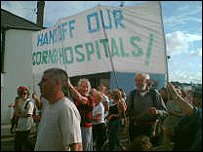
I’m sorry that this is such a long post – I don’t think that is good blogging practice, but this is an important issue for more than a million of us in the Local Government Pension Scheme (LGPS).
UNISON activists will be aware that our application for judicial review of the detrimental changes to the LGPS (which remove the right currently enjoyed by most scheme members to retire at 60 with an unreduced pension if we have 25 years service) will be heard in mid September.
In the mean time the Government have pressed ahead with a slight extension to the protection offered to existing members (essentially protecting the over 50s and offering partial protection to those aged 46 and above)(but nothing for the rest of us!!!)
For those who have noticed that the pensions fight has sunk from the front page of the UNISON website, it is reassuring to know that Regional pension briefings are taking place – but perhaps less reassuring to hear about the content of the briefings?
I can’t claim any credit for the following information, which I have received from my friend and comrade, Emma Goodall, from UNISON’s South East Region. What follows is Emma's report;
Emma Goodall's report of the briefing
Yesterday, the South East was the first region to undergo the LGPS Briefing. This is a one-day session run by national officers where branch activists are told about the 4 options which the government are offering on the future of the LGPS. This is being rolled out across all the regions over the next few weeks. The day's agenda was as follows (this might change in other regions, but I assume it will be broadly the same):
11 - 12 Overview of the options for consultation This presentation will give you a clear overview of the negotiations and the options presented for informal consultation. We will then give you the opportunity to ask questions about the options.
12 - 12.45 The Trade Union Side Agenda During this activity we will discuss the key elements of the trade union agenda and outline arguments to back up our position.
12.45 - 1.30 Lunch
1.30 - 2.15 Option B - Getting to know the option further Option B is the closest to UNISON's view on the way forward. However, there are parts of Option B that we will seek improvements on. We will develop some ideas about how to describe this option to members, outline our view on improvements and answer their questions about its potential impact.
2.13 - 3 The Next Stage of the Campaign In this final session we will consider the next steps of the campaign. We will specifically focus on engaging members and potential members, identifying areas to organise and campaigning locally to keep the pressure up.
Firstly, four hours (which includes a 45 minute lunchbreak) isn't nearly long enough. Glyn Jenkin's overview (first item) took over an hour and a half, including questions, so the second item was reduced to under half an hour. There was no time for debate, just hurried questions answered even more hurriedly.
I said to the organiser, National Education Officer, Louise Chinnery, that the day needed to be longer to allow for proper discussion and debate, but she said it wasn't possible and Glyn would just have to stick to his hour in future. Glyn's presentation was just the right length and cutting his time will only further reduce the opportunity for questions and discussion. I strongly recommend that you push in other regions for the briefing day to run from 11 to 4 at least.
For the second item, we had to look at the following objectives, coming up with reasons why each was an important TU side issue and what our key arguments were:
· Max protection for existing LGPS members
· LGPS remain as final salary scheme
· Improving take up among low paid by graduating contributions
· Single tier scheme
· Partners pensions for all and backdated to 1972
· Equality proofing the scheme
· Improvement in death benefits
Note there is nothing about keeping the 85 year rule, or keeping contributions for the majority at 6%!
The third agenda item is the real worry. The activity's stated aims are:
· To explore option B as closest to the trade union proposal
· To outline further improvements that we are seeking to this option
And, worst of all:
· To consider how we communicate the trade union side view to members
Glyn said the timescale is now too tight for us to look at any options other than the 4 the DCLG have given us for consideration. So we are accepting the government and employers' timescale and can only pick from their options!!! The third aim suggests there is already a trade union side view. Who decided what that view is? What is the point of a consultation if the trade union side has already made its mind up? And now they want us to accept it and try to sell it to our members.
Glenn Kelly's report on Option B
For those who haven't already seen Glenn Kelly's helpful SGE report on the options, this is what he says about Option B:
"Option B - A new final salary scheme with an improved accrual rate (1/60th rather than 1/80th) and no automatic lump sum on retirement
Once again on the surface this looks good and the employers estimate that this would cost them 1.1% on the pension bill.
So where is this additional money coming from….You guessed it out of the pockets of our members.
The scrapping of the 85-year rule (with protection only for those over 50 years old) will save the employers at least 2.2% on the pension bill. If the government and employers agree to give half of those savings back into the scheme as promised you get an additional 1.1% put back into the scheme to pay for improved benefits. So the money for this improvement comes out of the pockets of those members under 50 years old. Brilliant! They make out that they are giving us something, but in reality we’re paying for it ourselves. Look out for Prescott and Co. appearing on rogue traders next week!"
They are also proposing increasing contributions, to between 6.6% and 8.1% as well as detrimental changes to ill-health. Early retirement due to redundancy is being "dealt with" separately!
Our group asked "Are any of these 4 options worth working 5 years longer?" but Glyn ducked the question by saying that it depends what sort of pension scheme you want. I strongly suspect the real answer is "NO!"
So what do we do now?
It is clearly important that activists attend their Regional Pension Briefings (details are at
http://www.unison.org.uk/pensions/doc_view.asp?did=2603 )
I am convinced by Emma’s argument that whilst it may be that Option B really can be turned into a good deal for our members through negotiated improvements, we need to have a proper open debate around the issues, rather than being steamrollered into accepting a weak compromise.
The full consultation paper is here:
http://www.communities.gov.uk/index.asp?id=1501206 – activists need to look at this in order to determine how we should develop an argument around a fifth option, better than those on offer from the Government, and how we prepare our members for further action, which will be needed if we are to achieve the objectives we came out on strike for in March.

















